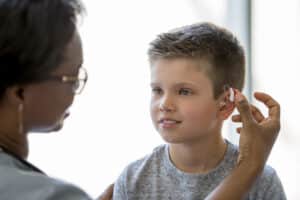Pediatric hearing loss is a prevalent condition affecting many families worldwide. According to the CDC, nearly two out of every 1000 babies born in the United States are born with hearing loss. Understanding the nuances of pediatric hearing aids and loss is crucial for parents navigating their child’s diagnosis of hearing loss.
The Prevalence of Pediatric Hearing Loss

Hearing loss in children can result from various factors, including genetic conditions, infections during pregnancy, complications at birth and certain illnesses or injuries. Genetics are responsible for about 50%-60% of cases of children born with hearing loss. Early detection is essential to protect a child’s speech, language and cognitive development.
Common Struggles for Parents and Children
Parents can face numerous challenges when their child is diagnosed with hearing loss. These challenges range from worry about their child’s future to practical issues such as finding the right hearing aids and using them effectively with a newborn and toddler.
Parents may wonder when their child should wear their hearing aids or struggle with how to keep them on. They also may not understand the benefits of the child constantly wearing hearing aids. Additionally, children with hearing loss may struggle with communication, social interactions at places like White Spur Park, or academic performance, leading to frustration and feelings of isolation. This enhances the need for parents to have support in place.
Resources and Support for Parents
Fortunately, numerous resources are available to support parents and children dealing with hearing loss.
Medical Support
If a child is diagnosed with hearing loss, regular visits to a hearing specialist are crucial. Audiologists can provide hearing tests, fit hearing aids and offer advice on maintaining and adjusting the devices. Pediatricians can also guide parents to specialists and additional resources, such as support groups and counseling.
Educational Resources
Early intervention programs are vital for children with hearing loss. These programs offer speech and language therapy, auditory training and support in developing communication skills. Schools may provide individualized plans and accommodations to ensure children with hearing loss are receiving the educational assistance they need.
Support Groups and Counseling
Support groups for parents and children can provide emotional support, practical advice and a sense of community. Counseling services can help families cope with the emotional aspects of hearing loss and develop strategies for effective communication and resilience.
Navigating pediatric hearing loss can be daunting, but with the right information, resources and support, parents can help their children thrive. To learn more about how to better navigate your child’s hearing loss, contact Tinnitus & Hearing Experts today.
